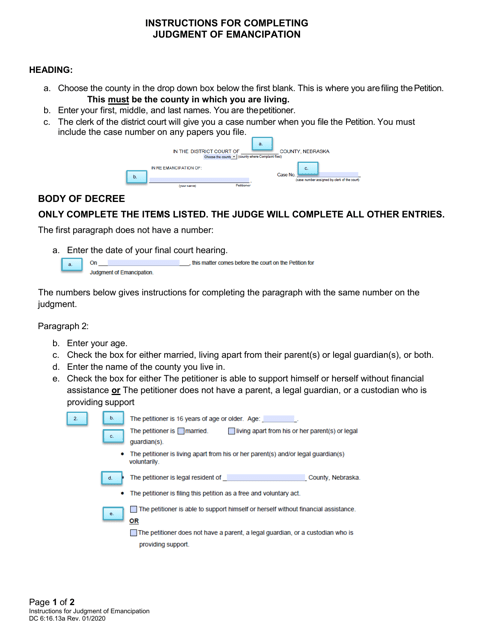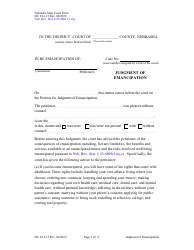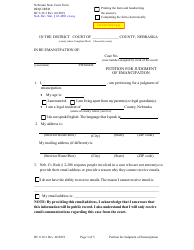This version of the form is not currently in use and is provided for reference only. Download this version of
Instructions for Form DC6:16.13
for the current year.
Instructions for Form DC6:16.13 Judgment of Emancipation - Nebraska
This document contains official instructions for Form DC6:16.13 , Judgment of Emancipation - a form released and collected by the Nebraska District Court. An up-to-date fillable Form DC6:16.13 is available for download through this link.
FAQ
Q: What is Form DC6:16.13?
A: Form DC6:16.13 is the official form for filing a Judgment of Emancipation in Nebraska.
Q: What is a Judgment of Emancipation?
A: A Judgment of Emancipation is a legal document that declares a minor to be legally independent from their parents or guardians.
Q: When is Form DC6:16.13 used?
A: Form DC6:16.13 is used when someone wants to petition the court for emancipation in Nebraska.
Q: Who can file Form DC6:16.13?
A: A minor who is at least 16 years old and meets certain criteria can file Form DC6:16.13.
Q: What are the criteria for filing Form DC6:16.13?
A: The criteria include being a Nebraska resident, being financially self-supporting, and being able to demonstrate the ability to make independent decisions.
Q: Are there any filing fees for Form DC6:16.13?
A: Yes, there are filing fees associated with filing Form DC6:16.13. The fees may vary depending on the county.
Q: What other documents are required to file Form DC6:16.13?
A: In addition to Form DC6:16.13, other documents such as a petition, an affidavit, and a financial statement may be required.
Q: How long does it take for a judgment of emancipation to be granted?
A: The time it takes for a judgment of emancipation to be granted can vary. It typically involves a court process and may take several weeks or months.
Q: Can a parent or guardian object to a judgment of emancipation?
A: Yes, a parent or guardian can object to a judgment of emancipation. They have the right to present their case and argue against emancipation.
Q: What are the consequences of emancipation?
A: Emancipation gives a minor the right to make their own decisions and be legally responsible for themselves. It also means that they may no longer have access to certain benefits and protections provided by their parents or guardians.
Instruction Details:
- This 2-page document is available for download in PDF;
- Actual and applicable for the current year;
- Complete, printable, and free.
Download your copy of the instructions by clicking the link below or browse hundreds of other forms in our library of forms released by the Nebraska District Court.






